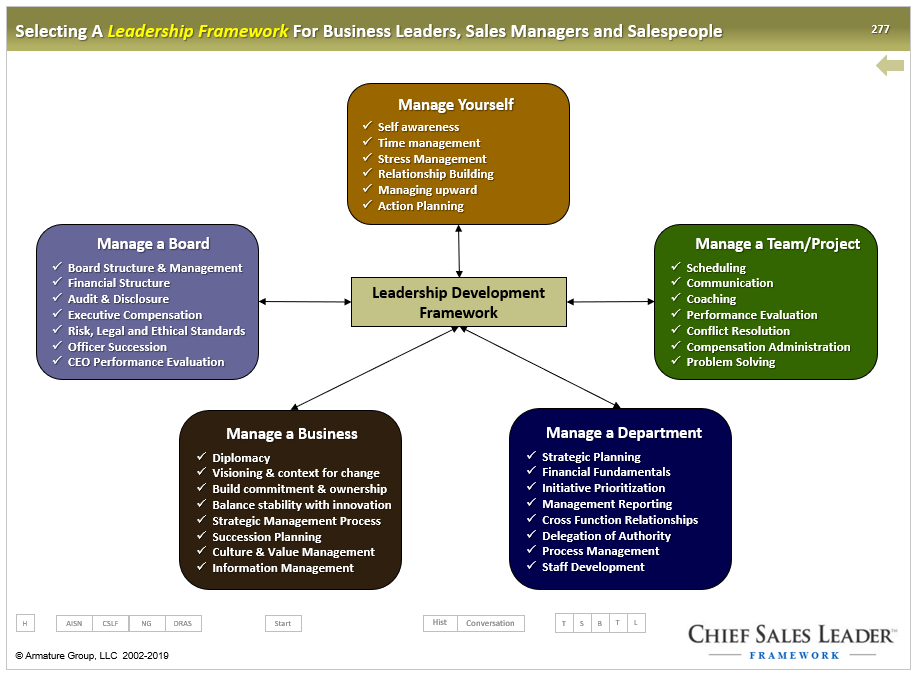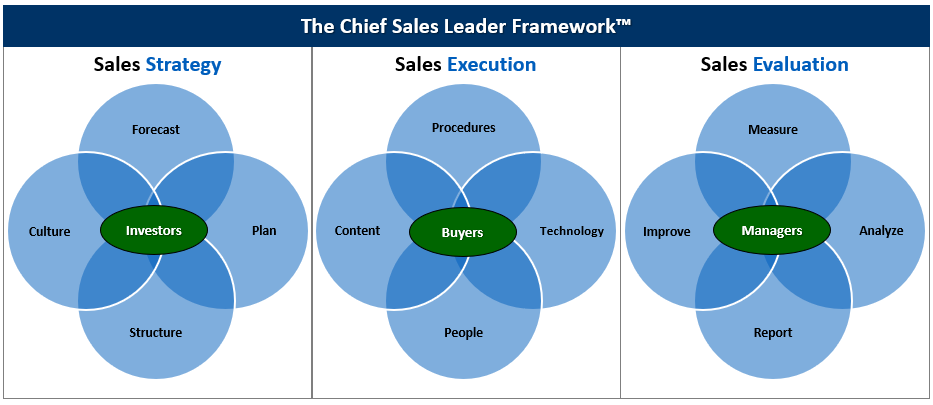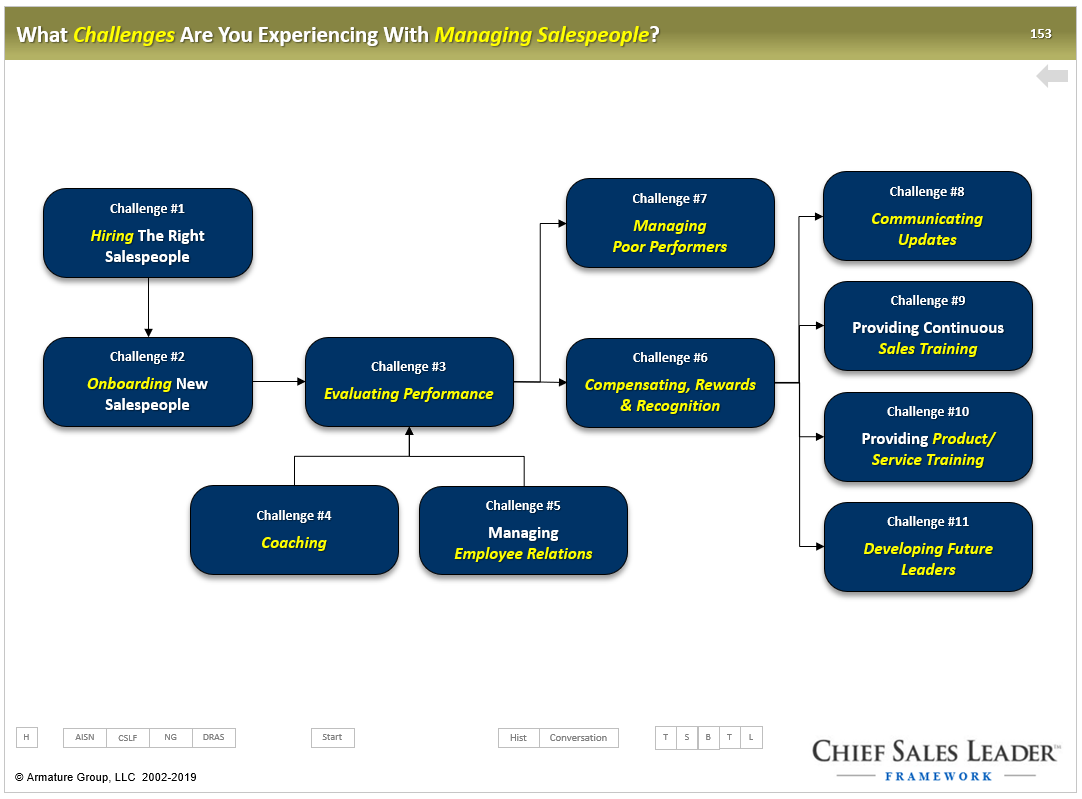How To Develop Future Sales Managers and Chief Sales Executives
At face value, the steps for developing future sales managers and Chief Sales Executives is straightforward:
- Identify high potential candidates
- Assess each candidate’s skills and knowledge
- Provide internal and external training
- Assign them to high profile special projects and/or rotational assignments
- Connect them with a mentor and/or coach
- Track their development
That’s the easy part. The hard part is selecting the right skills and knowledge for them to develop. So, what framework are you using to guide the development of salespeople into sales managers, Chief Sales Executives, and CEO’s? Unfortunately, there is no textbook on how to build, manage, improve, and merge sales teams. So, business leaders are left to randomly select skills based on experience and input from advisers.
In the absence of a universally accepted approach, this post will provide a Leadership Development Framework, a Sales Management Process Framework, and five quick steps for developing future sales managers.
A Leadership Development Framework
This framework defines the skills required at each level of job responsibility including managing yourself, a team or project, a department, a company, and a board of directors. It helps:
- Employees understand and focus their career development planning efforts.
- Business leaders assess, train, and mentor high potential future sales managers and business leaders.
- Human resource leaders screen and interview job candidates at all levels of the organization.
Before launching development programs for high potential future managers and business leaders it’s critical to understand their aspirations and dreams. Do your high potential future sales managers want to manage other people? Are they capable of imparting their knowledge to your salespeople? Can they handle the emotional aspects, and at times volatility of managing people?
A Sales Management Process Framework
This hierarchical framework defines the processes that are required for a sales team to execute with precision – – effectively, efficiently, and predictably. It consists of three strategic processes, twelve operating processes, hundreds of sub-processes, and thousands of tasks, including sales:
- Strategy – forecasting, planning, organization structure, and culture
- Execution – process, management, technology, and information
- Evaluation – tracking, analyzing, reporting, and process improvement
These are the strategic job responsibilities that sales managers and Chief Sales Leaders need to master. Before launching training and development for future Chief Sales Leaders it’s important to prioritize the twelve operating processes. It’s important to rank order them from most effective, efficient, and predictable to least. Have procedures been documented for all twelve? Are measures in place to provide insight on when leadership processes are in or out of control? How frequently do business leaders review the measures? Are actions plans put in place to improve sales leadership processes?
A Sales Management Framework
One of the twelve sales leadership processes above is “people” i.e. managing salespeople. There are eleven sub-processes that sales managers use to enable salespeople to execute with precision – – effectively, efficiently, predictably including:
- Hiring the right salespeople
- Onboarding new salespeople
- Evaluating the performance of salespeople
- Performance improvement plans for poor performing salespeople
- Coaching salespeople
- Employee relations within the sales team and between other departments
- Compensating, rewarding, and recognizing salespeople
- Communicating updates to salespeople
- Sales training
- Product and service training
- Developing future sales and business leaders
These are the daily job responsibilities that sales managers need to master. Have procedures been documented for all eleven? Are measures in place to provide insight on when management processes are in or out of control? How frequently do business leaders review the measures? Are actions plans put in place to improve sales management processes?
Quick Steps For Developing Future Sales Managers and Chief Sales Executives
While programs for developing future sales managers can be comprehensive and time consuming there are five quick steps to expedite results. These steps will focus your programs and keep you from wasting time, money, and morale.

Career Development Plans – have you asked your salespeople and managers what their career aspirations are? What are their one, five, and ten-year career plans in relationship to each stage of the Leadership Development Framework above? Are your high potential future sales managers actually aspiring to manage people? It’s important to understand what they’re dreaming about before investing time and money into the process.

Core Values Assessment – how are you measuring the degree to which your employees, managers, and executives are living your company core values? Are your high potential future sales managers role models for these values? If not, that should be their first development priority. It’s a straightforward exercise. Define three to five behaviors for each core value. Then conduct a 360-degree assessment for each high potential future sales manager. Then factor this feedback into their career development plan.

Sales Management Process Prioritization – what sales management process skills need to be improved at your company? Do your salespeople, managers, and business leaders agree on these priorities? If not, have them rank order your skill development priorities within each of the twelve operating processes above.

Content for Developing Future Sales Managers – what content (training materials, articles, blogs, videos, webinars, etc) are you using to educate your future sales managers? How aligned is this content with your sales management process priorities. tarting with the highest priority skill development priority, select content for developing future Chief Sales Executives including books, articles, and videos, blogs to follow, eLearning programs, classroom-based programs, webinars, etc.

Book of The Month – can be used to expedite the process, establish a common language, and build bridges with business leaders. Establishing a common language is more important that picking the right book for each of the twelve operating processes, sub-processes, activities, and tasks.
A Quick Reminder
Your approach for developing future sales managers can also serve as a platform for building cross-department knowledge and relationships. Involving marketing, sales enablement, operations, accounting, legal, and other high potential future business leaders is important. Driving revenue growth is critical for businesses to thrive. So, the more that high potential future business leaders know about the Sales Management Process Framework the better.
Conclusion
Developing future sales managers requires starts with an understanding of what high potential employees career development plans are. What level of management responsibility are they seeking? For those that want to manage salespeople and a sales organization, we need to assess, train, and mentor them on The Sale Management Processes. Developing skills in all twelve operating processes is essential. Using this framework will focus content selection, training programs, mentors, and all other aspect of developing future sales managers.
Please Take A Minute To:
- Write a comment on this post
- Click Here to learn more about The Chief Sales Leader Framework™
- Share this blog with other sales leaders, salespeople, CEO’s and investors
It’s time to bring precision – – effectiveness, efficiency, and predictability – – to sales execution.




